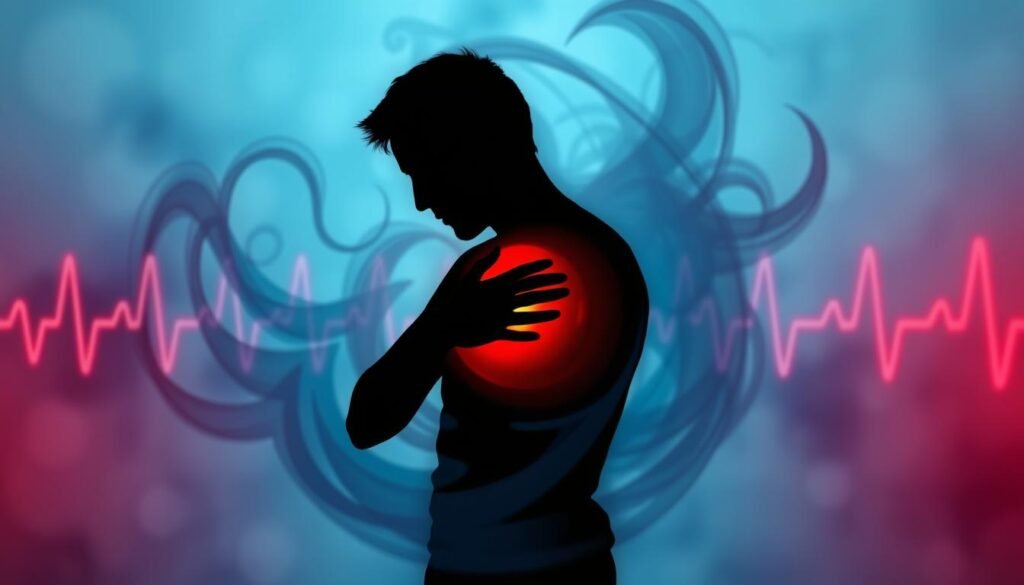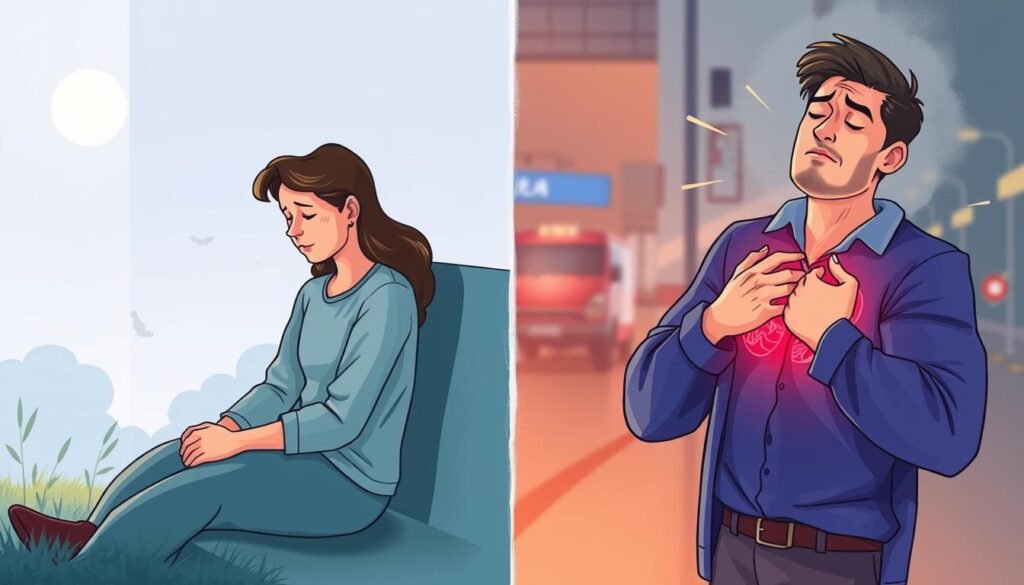Did you know panic disorder affects 1 to 4 in every 100 people? It’s quite common and often leads to symptoms like chest pain. Research shows between 20% to 70% of those with panic attacks feel chest pain.
This shows a clear link between anxiety and physical pain. About 18% to 25% of folks going to emergency rooms for chest pain might have panic disorder. This guide will share tips and professional advice on handling chest pain caused by anxiety. It’s a helpful tool for anyone dealing with this issue.
Key Takeaways
- Panic disorder is a prevalent condition affecting 1 to 4% of the population.
- Chest pain occurs in 20% to 70% of panic attacks, underscoring its commonality.
- 18% to 25% of patients with chest pain in emergency settings may have panic disorder.
- Selective serotonin receptor inhibitors (SSRIs) are among the primary medications for managing anxiety-induced chest pain.
- Up to 50% of low-risk chest pain patients in emergency departments experience anxiety.
Understanding Chest Pain: A Common Symptom of Anxiety
Chest pain can be scary, especially when it’s due to anxiety or panic attacks. Studies show that 22% to 70% of panic attacks involve chest issues like tightness. This affects about 1 to 4 out of every 100 people. Often, those who rush to emergency rooms with chest pain are actually dealing with panic disorders. Around 18% to 25% of them are in this situation.
Knowing the link between chest pain and anxiety is key. Stress hormones such as cortisol can make your body react with a “fight or flight response”. This can cause uncomfortable feelings in your chest. This pain usually hits the center or left side, making it different from heart attack signs. For those with panic disorder, the pain feels sharp or comes with tingling in hands and fingers.
Understanding anxiety’s symptoms can help people recognize when chest pain is from stress, not a heart problem. About 58% of chest pain cases come from anxiety or panic. It’s important to know how to calm this stress. Ways to ease the pain include relaxing, regular exercise, and eating right.
Getting chest pain wrong can cause needless worry and doctor visits. If chest pain is bad or comes with trouble breathing or nausea, get medical help right away. Quick and correct treatment is crucial. It helps manage anxiety and lowers the risk of more issues.
What Causes Anxiety-Induced Chest Pain?
Anxiety-induced chest pain is a mix of mind and body factors. Though many think it’s heart-related, it often isn’t. Knowing the difference is key to handling it correctly.
Cardiac vs. Non-Cardiac Causes
Chest pain can be from heart issues or other causes. Heart-related anxiety symptoms might come from limited blood to the heart. This can happen with stress, when the body needs more oxygen.
Non-heart chest pain might be from muscle tension or esophagus issues, often from breathing too fast. Figuring out if the pain is from the heart or not directs the best treatment. For more insight, visit this resource.
Role of the Autonomic Nervous System
The autonomic nervous system is crucial in anxiety and its physical effects. Anxiety can activate the system, causing a faster heartbeat and tight muscles. This might feel like a heart problem but isn’t. Understanding how stress affects the body can help manage anxiety chest pain.

Recognizing the Symptoms of Anxiety Chest Pain
The way people describe anxiety chest pain can vary a lot. It’s key to know these differences to avoid panic or wrong diagnoses. Anxiety-related chest pain can feel like sharp jabs, a constant dull ache, or even sudden muscle spasms. There might also be a tight feeling in your chest. Since these feelings can be different for everyone, it can be confusing to figure out if it’s anxiety.
Various Descriptions of Chest Pain
For those with anxiety, chest pain comes in many forms, which can be worrisome. You might feel:
- Sharp Pain: This comes quickly and hits hard.
- Dull Aches: This is a constant pain that can linger for hours.
- Tightness: It feels like something is squeezing your chest.
- Muscle Spasms: These are sudden and might hurt a lot.
Knowing the range of how chest pain can feel helps people understand it’s a common anxiety symptom. This can provide some comfort.
Misinterpretation of Symptoms
It’s common for people to mistake anxiety chest pain for something more serious. This fear often sends them rushing to the ER, thinking they’re having a heart attack. In fact, 22% to 70% of people with panic attacks say they feel chest pain. This mix-up can cause both mental and physical stress. It can also lead to lots of medical tests that may not be needed. Understanding how anxiety affects your body is crucial.

Knowing the difference between heart issues and anxiety can help people manage their health better. It leads to smarter health choices.
Differentiating Anxiety Chest Pain from Heart Attack Symptoms
Chest pain is common and can mean anxiety or a heart attack. Knowing the difference is key for the right action. Anxiety chest pain is sharp and felt even when still. But heart attack pain grows slowly and can spread to arms, neck, or jaw.
About 3% of U.S. adults have panic attacks each year. It’s important to know when a panic attack is happening. Many fear chest pain is a heart attack, but it could be anxiety. This confusion makes knowing the difference vital.
To tell anxiety chest pain apart from heart attack symptoms, look at the pain’s intensity and how long it lasts. Panic symptoms are short-lived, while heart attack signs last longer or come and go. Spotting the difference early can save lives by getting help fast.
| Symptom | Anxiety Chest Pain | Heart Attack Symptoms |
|---|---|---|
| Type of Pain | Sharp, localized | Pressure-like, can radiate |
| Duration | Minutes to an hour | Persistent or waves |
| Other Symptoms | Shortness of breath, palpitations | Nausea, sweating, back/jaw pain |
| Emotional Trigger | Commonly triggered | Possible, but often physical |

Managing Chest Pain Due to Anxiety
Dealing with anxiety chest pain needs a complete approach with professional advice. If you have these symptoms, you should get professional help for anxiety. It’s important to know if your chest pain is from anxiety or something else. Knowing exactly what’s wrong helps doctors create the best plan. This plan will help with both your mind and body.
Importance of Seeking Professional Help
Professionals are key in handling anxiety chest pain. They look at your symptoms carefully to avoid wrong diagnoses. This careful look lowers the chance of fearing symptoms for the wrong reasons. Talking to doctors means getting treatments that really work for you. This means a better way to deal with anxiety pain.
Effective Medications and Therapies
There are many medicines and therapies that help with anxiety chest pain. Doctors often suggest anxiety medications like SSRIs and benzodiazepines. These help calm your mood and lessen anxiety signs.
Therapies, especially effective therapies for anxiety like Cognitive Behavioral Therapy (CBT), are also helpful. They teach ways to handle stress better. Therapists work with you to find ways to deal with what triggers your anxiety. This can make chest pain happen less often.
| Treatment Type | Description | Examples |
|---|---|---|
| Medications | Pharmaceuticals targeting anxiety symptoms and mood stabilization | SSRIs, Benzodiazepines |
| Therapies | Psychological interventions to alter thought patterns and behaviors | Cognitive Behavioral Therapy, Exposure Therapy |
| Alternative Approaches | Complementary practices promoting relaxation and mindfulness | Meditation, Yoga |
Using different treatments together can help you manage symptoms better. This will improve your life quality while you deal with anxiety chest pain.
Home Remedies and Lifestyle Modifications
Over 19% of adults in the United States face anxiety disorders annually. Home remedies and lifestyle changes can help. They improve physical health and ease anxiety symptoms like chest pain, boosting overall well-being.
Practicing Deep Breathing Techniques
Deep breathing is a key way to fight anxiety. By inhaling for ten seconds and exhaling for the same time, you can stabilize your heart rate and lessen discomfort. It’s an easy method to add to daily life, helping calm anxiety effectively.
Mind-Calming Techniques
Mindfulness and visualization can greatly help with anxiety. These practices help focus on peaceful images. A 2023 study found that 8 weeks of mindfulness-based stress reduction can lower anxiety symptoms. It helps lessen chest pain frequency and severity linked to anxiety.
Maintaining Physical Health
Leading a balanced life is key to managing anxiety. Regular exercise, particularly intense workouts, can significantly reduce anxiety more than lighter activities. To manage anxiety, eat well and sleep enough, about seven hours or more, as the CDC advises. Also, cutting back on caffeine and alcohol can help ease anxiety, leading to better mental health.
When to Seek Medical Attention
Knowing when to see a doctor for chest pain is very important. This is especially true for the millions dealing with anxiety disorders. Anxiety can cause chest pain due to muscle tension and hyperventilation. But, some symptoms need a doctor’s check to rule out more serious issues.
These signs mean you should get medical help:
- Severe or lasting chest pain for more than a few minutes
- Pain spreading to the arms, jaw, or back
- Feeling short of breath, dizzy, or breaking out in cold sweats
- Any new or changing symptoms in your usual anxiety patterns
Not paying attention to these could delay important treatments. It’s vital to know the difference between chest pain from anxiety and heart problems. Knowing when to seek advice for anxiety symptoms is crucial too. This is true if these symptoms greatly disrupt your daily activities.
For trustworthy details and to understand how anxiety affects your body, check out this link. It explains how anxiety and chest discomfort are connected. It also tells us why we shouldn’t ignore symptoms that harm our health.
Coping with Anxiety-Related Chest Pain
Finding ways to deal with anxiety-related chest pain involves many steps. There are many effective therapy options for anxiety out there. It’s key to pick a treatment plan that suits you best. This might mean trying cognitive-behavioral therapy (CBT) or exposure therapy. These methods help people change how they think and react to anxiety. They provide long-term relief from anxiety chest pain.
Therapy Options and Treatment Plans
There’s a range of therapy options for anxiety that offer support. Here are some recommended ones:
- Cognitive Behavioral Therapy (CBT): Helps in changing negative thoughts.
- Exposure Therapy: Slowly makes anxiety triggers less frightening.
- Medication: Sometimes, medicine can help manage symptoms.
- Mindfulness-Based Stress Reduction: Uses meditation to reduce stress.
Working with mental health experts helps tailor a treatment plan. This plan gives a clear path to coping with chest pain from anxiety. It helps you keep making progress.
Long-term Strategies for Relief
Having long-term strategies for managing anxiety helps you get better over time. Try adding these practices to your life:
- Build a Support Network: Having supportive people around can lessen loneliness.
- Keep Going to Therapy: Regular therapy helps strengthen coping skills.
- Use Mindfulness and Relaxation Techniques: Meditation, yoga, or deep breathing can reduce anxiety slowly.
- Improve Physical Health: Exercising, eating right, and sleeping enough improves mental health.
- Steer Clear of Alcohol and Smoking: These can make anxiety worse, so avoid them.
Conclusion
Understanding chest pain and its link to anxiety is vital. 12% to 16% of people feel chest pain, which often relates to anxiety. Using lifestyle changes, breathing exercises, and professional guidance can help manage this. These steps empower individuals to ease their symptoms and lower anxiety.
Statistics show the importance of knowing how anxiety and physical symptoms are connected. 30% to 50% of non-heart-related chest pains are due to anxiety disorders. Being aware of this fact can lead to faster relief. Methods like relaxation and regular exercise are effective against anxiety-induced chest pain.
Effectively dealing with chest pain from anxiety is possible with the right methods and support. It’s crucial to tackle both mental and physical sides of anxiety to get lasting relief. Remember, addressing these aspects can stop anxiety’s harmful effects on the body.